Slough - WW and George Peacock have 'absolutely turned his [Babbage] brain by your inflammatory conversation'. Babbage has been 'running analysis mad' and so has JH: 'I really have read and written more in the last fortnight than ever I did in twice the time in any other part of my life and I advise you to go and do likewise'. 'The distress of the poor and the pressure of the times forms the subject of conversation here'.
Two drawings, "Ye crowning of ye Jarl Harold" showing Harold's coronation as depicted in the Bayeux Tapestry, and an illuminated manuscript page of the beginning of the Ten Commandments. Accompanied by an envelope which identifies these as illuminations done in childhood.
On the fly-leaf are some lines of poetry partly pencilled and then inked over, partly in ink originally. On the fly-leaves at the other end are further fragments in ink and pencil, and one is headed: ‘Plan of a Poem. The Seasons. | Spring. The Visitation, &c.’ Other verses in pencil are on blank pages in the body of the volume, which consists of botanical notes, predominantly on fungi. At the other end is the date 23 Sept. 1793.
Sin títuloA collection of some of the printed material and letters received by Whewell between 1819 to 1833, of which the materials relating to the Cambridge elections of 1829 and 1830 form a part.
Sin títuloGenoa.
23 Bruton Street, W.—In Mrs Pethick-Lawrence’s case the proper course would probably be to move the King’s Bench on the ground of informality in the proceedings rather than to ask a question in Parliament.
Has nearly finished writing his book A Levy on Capital.
Explains why he thinks capital a more suitable measure for a special tax than income.
—————
Transcript
21st. June, 1939.
Dear Nash,
It was a great pleasure to see you at dinner the other night but I was sorry not to have had the opportunity of explaining to you the little point regarding which you asked my view, namely, why I think that capital rather than income is a suitable measure for a special tax. My answer is twofold.
First, I think in general that both capital and income are measures of a man’s capacity to pay. Apart from death duties which only operate after a man’s death, all the burden is laid on income and to such an extent that the most elaborate devices are resorted to to enable a man to avoid taxation. I doubt whether very much steeper income taxation can be adopted successfully without finding some new principle to prevent evasions in future. A tax on capital avoids some of these difficulties.
Secondly, for the purpose of the emergency it is the capital position about which I am most concerned. We shall of course all agree (as I said in my speech on the Budget Proposals) that you cannot make shells out of the title deeds of wealth and you must depend on the margin of income over expenditure for the purpose. But this margin will be spread over the community in various proportions according to accidental circumstances. Whereas the people who ought ultimately to pay are the people of great wealth. This is reinforced by the fact that, in the case of the very rich, income tax, surtax (even without any allowance for insuring against death duties) already take a very large slice of income and it would not be physically possible to take much more. Whereas if the tax is regarded specifically as a tax on capital there is no reason whatever why in this emergency they should not be called upon to hand over part of their title deeds of wealth and so prevent a serious increase in the national debt.
Yours sincerely,
[blank]
The Hon,† Walter Nash,
Savoy Hotel,
Strand,
London, W.C.2.
—————
† Sic.
11 Brighton Terrace, Icknield Street West, Birmingham.—Has returned to Birmingham with his sister after an absence connected with some sad news. Is pleased that Lawrence has begun doing something. Discusses the progress of work on the Newark bridge and the arrangements at the works. Henderson is ill.
(Black-edged paper.)
—————
Transcript
11 Brighton Terrace | Icknield St. West | Birmingham
1st. Oct. 1851
My dear Lawrence,
I have your kind note of the 15th. Ult. before me & feel quite ashamed of my neglect, but I have had so much to do & think of these last few Weeks, I can scarcely realize the time which has elapsed.—I returned here on the Monday Night with my Sister by the Mail Train,—just a week after I had first heard the sad news.—My reason for coming back so soon was because I knew my presence was wanted at the Works,—& Mr. Henderson had behaved so kindly in the matter, I did not like to appear taking any advantage.—The change of Air seems to have done my Sister much good,—although she is necessarily very lonely. I however persuaded her yesterday to pay a visit to some Friends who reside at Handsworth, & were very anxious to see her.—I think a little society every-way beneficial,—as my eldest Sister Mrs. S— is very far from well, I fear my Sister’s visit here must be short, her return to Town is already besought.
I intend if possible to take her up myself as I wish to pass a day or two in Town.—
I am very glad to hear you have commenced doing something, although you speak so vaguely I have but little information on the subject,—it is too bad of you to keep one in such suspense.—Why not tell me where & what you are building.—I suppose it will all come in time.
So you see your friend H. G. is at last a liveryman. I have heard nothing of yourself or how you came off—or rather whether you ventured to stand the test.
The Newark Bridge is getting on most dreadfully slow,—& I do not think it will leave our Works for another 3 Months.—There is great difficulty in rolling some [of] {1} the Links for it,—it is still under my entire Charge & I have been at Newark several times setting out Foundations, & arranging the plans & contract for the staging.—
I get on very well with Mr. Henderson, & am not any way mixed with the draughtsmen,—who at this place are a very seedy lot, & for the most part badly paid, & bullied dreadfully they never see Henderson,—but have their orders, through an old Chap who keeps the drawings.—I on the contrary am privileged to enter his rooms when I have occasion, receive all my instructions direct, & am now generally employed, getting out rough sketches & designs under him,—& which the draughtsmen have afterwards to make drawings of.—
When I add to this, that my Salary has been raised as promised & all my back Money paid,—you will suppose I have nothing much to complain of at present,—indeed I am myself quite amazed at my good fortune, when I contrast the treatment I have received with many of those around.—
You will of course recollect old Mowatt of “savage” memory—if I recollect aright he left our Works because of his temper.—Well I should say his temper & his conceit has been the ruin of him do you know that Chap positively got “Henderson” his situation at these Works first,—& now is himself there at the rate of 25s– per Week,—working from 8 oclock in the Morning till 7 at Night, if this time is not made it is all deducted from the said money.
The Chap is as good a draughtsman as ever, but he drinks occasionally, & is fearfully obstinate & altogether has fallen irretrievably he is now also quite a Misanthrope & inveighs with stern energy against such “upstarts” as myself for instance, or in fact with anybody who is happy & contented or speaks a good word of Henderson or gets more tin than him.
For the bye speaking of Mr. H.—I am sorry to tell you his health is very precarious & at times he appears in great pain.—Yet such is his indomitable spirit he will not give up working, for instance,—the other night he was so ill whilst conversing with me he was obliged to send for his Carriage & go home, abt 4 oclock in the afternoon,—saying he would finish the matter with me the next Morning.—Judge my surprise in half an hour to receive a summons to go to his house upon arriving there,—he had just had a warm bath, & was lying on the sofa—& he kept me talking on several matters for 2 hours,—before he would go to bed.—
I fear to have bored you a great deal by the egotism I seem to have displayed in writing so much abt myself—really I do not mean it,—& it is but an apology for a better subject. Should you deem me able to afford you any information you might require I think you will do me the justice to beleive†,—it would confer the greatest pleasure on me to be able to assist in anything whatever.—
Hoping to hear from you soon,—& with my kind regards to your family,
Believe me as ever,
Yrs. Faithfully
Joseph Phillips
—————
{1} Omitted by mistake.
† Sic.
Kensington. Invites him to dinner
(Carbon copy.)
Mansfield House, Canning Town, E.—Sends New Year’s greetings. Describes his visit to Coblenz.
7 Carlton Terrace. Has received note and 2 volumes, is expecting Mrs Everett from America
(With an envelope.)
—————
Transcript
Trinity College | Cambridge
5 Feb. 1930
My dear Gerald,
This is a belated answer to your letter to me at Christmas, which I hope you enjoyed at Rupert’s. They tell me that it was very difficult to get you to leave your work even to go and see your family, so I don’t know whether I can induce you to come here some time from Saturday to Monday. So far as I can see ahead, any date would suit me; but during term, that is down to the middle of March, it would be necessary for me to know some time beforehand, as I might not be able to get you a bed in College.
I hope the arrangements which you were trying to make about the D. Sc. have turned out successfully.
Your bad language about the English climate is really rather ungrateful, for it appears from statistics that last December was the sunniest within human memory.
I had plenty to eat and drink at Christmas, and consequently am quite well, as I hope you are.
Your affectionate godfather
A. E. Housman.
[Direction on envelope:] Gerald Jackson Esq. | 85 Oakley Street | Chelsea | London S. W. 3.
—————
The envelope, which bears a 1½d. stamp, was postmarked at Cambridge at 9 p.m. on 5 February, and has been marked in pencil
‘5 feb 1930’.
Chines. Is in poor health


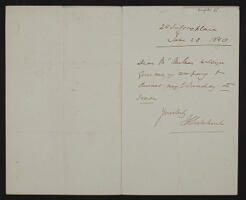

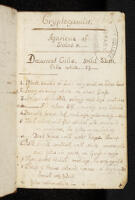



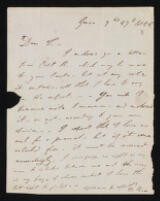







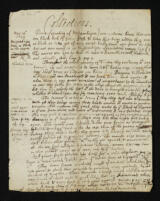









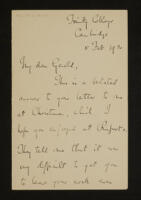


![Letter from Jean-Charles-Leonard de Sismondi to Lady Charlotte [Bury]](/uploads/r/trinity-college-library/5/2/7/5277578642d3a41412e175802661c9786dbb426dc790e5b92cd6dd1c6bf16fc6/025.SRMS.B15.10.front.tmb.jpg)